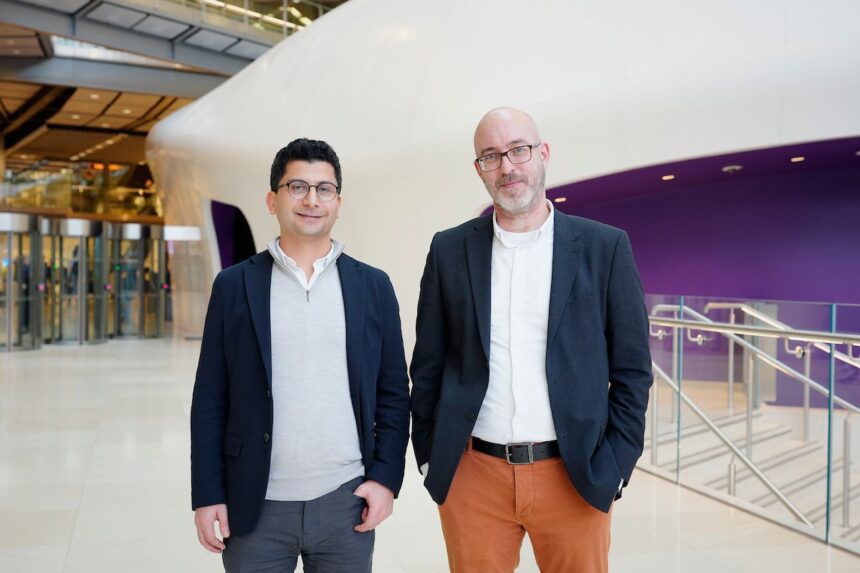Meet Cambridge Medixine: Unlocking the next generation of mRNA therapeutics

In recent years, mRNA has transformed from a promising research concept into one of the most exciting and validated modalities in modern medicine. But what we’ve seen so far, largely in the context of vaccines, is just the beginning.
Meet Zinc portfolio company Cambridge Medixine, a next-generation mRNA platform company co-founded by Dr. Ahmet Can Berkyurek and Dr. Andreas Claas, two brilliant mission-led scientists with deep expertise in molecular biology, translational medicine, and drug discovery. Based in the UK’s biotech hub of Cambridge, the team is tackling some of the fundamental limitations of current mRNA technology with a bold vision: to make mRNA therapeutics safer, more effective, and accessible to many more patients.
Reimagining mRNA from the ground up
Cambridge Medixine is much more than a mRNA therapeutics company, it is a platform innovation play. At the core of their work is a novel method of leveraging AI to engineer and develop mRNA molecules that enable more efficient intracellular delivery, while minimising unwanted immune responses. These advances could lead to lower required doses, fewer side effects, and greater therapeutic precision.
While existing mRNA therapeutics, especially vaccines, have proven their power, broad clinical applications remain constrained by delivery inefficiencies, immunogenicity, and tolerability challenges. Cambridge Medixine’s approach addresses all three, potentially opening the door to a wide range of new applications, from oncology and rare diseases to autoimmune disorders and beyond.
Innovation with the potential for global impact
The market potential is massive. The global mRNA therapeutics market is projected to exceed $70B by 2030, with demand expanding far beyond infectious disease. Cambridge Medixine is building a technology platform that directly addresses these issues. Their IP-driven approach has the potential to create differentiated assets with strong barriers to entry, enabling durable value creation across multiple therapeutic verticals.
An exceptional team with a huge vision
Ahmet and Andreas exemplify exactly what we look for in founders here at Zinc. They bring a compelling combination of academic excellence, translational experience, resilience and a huge vision. They met during their time at Vax Equity, a developer of viral saRNA technology, bonding over a shared frustration with the limitations of existing mRNA approaches and a mutual drive to build something better.
Their interdisciplinary backgrounds – in immunology, RNA biology, computational biology and translational science – have enabled them to move quickly, iterate effectively, attract world-leading advisors and build early technical and commercial validation for the platform. Investors often talk about “founder-market fit”, and Cambridge Medixine has it in spades.
Read on to hear in their own words what has motivated Ahmet and Andreas to make the leap from the lab to entrepreneurship, the progress they have made, and their plans for the future…
Meet the Team: Q&A with the Founders of Cambridge Medixine
Building on their deep academic backgrounds and a shared desire to bridge the gap between cutting-edge science and clinical impact, Ahmet and Andreas are rethinking how therapies and vaccines are delivered, handled by the body, and ultimately used to treat complex conditions. We sat down with them to hear more about their journey, what they’re building, and why they believe the next wave of mRNA innovation is just the beginning:
Q: For those unfamiliar, what is Cambridge Medixine and what are you building?
Ahmet: Cambridge Medixine is an mRNA platform company. We are building a new kind of delivery system for mRNA therapeutics, one that allows for safer, more precise, and more efficient function in the cells. That opens up a lot of opportunities in terms of what conditions mRNA can be used to treat.
Andreas: Our goal is to unlock mRNA’s full potential beyond what we’ve seen to date with vaccines. We’re developing technology that makes it possible to use mRNA more effectively in chronic diseases, cancer, and other areas where the current platforms fall short.
Q: What makes your approach to mRNA different from what’s already out there?
Andreas: The current generation of mRNA technology is amazing, but it has limitations – mainly around efficacy and immunogenicity, the ability of a vaccine or drug to trigger an immune response in the body. In simple terms, it’s still hard to get the mRNA where it needs to go, and when it gets there, it can sometimes result in unwanted immune responses.
Ahmet: What we’ve developed is a proprietary way to package and deliver mRNA that protects it, increases uptake by the right cells, and avoids setting off the immune system. That means we can use lower doses, reduce side effects, and target more complex diseases.
Q: Where did the idea come from? What inspired you to start Cambridge Medixine?
Ahmet: The insight and idea behind Cambridge Medixine came as a result of a combination of my PhD and postdoc work, and our experience in the biotech industry. I had spent years studying how mRNA behaves in different contexts and became increasingly frustrated with how limited the current delivery technologies were. At some point I thought, we must be able to do better than this.
Andreas: I had come from a translational medicine background and saw a similar gap. This incredible science wasn’t reaching its full clinical potential. Ahmet and I met during our time at Cambridge, and we had a lot of those “what if…” conversations. Eventually, we decided to do something about it – and Cambridge Medixine was born.
Ahmet: We both had that itch, to not just publish papers, but to build something real that could help people in a meaningful way.
Q: Why do you think this is the right time for next-generation mRNA innovation?
Andreas: COVID-19 proved the power of mRNA to the world. But it also highlighted the limitations, especially when you move beyond infectious diseases. There’s a growing recognition now that we need better delivery, better safety, and more flexibility if we want to apply mRNA to other areas.
Ahmet: We see ourselves as part of the next generation of mRNA innovation. The science is validated. Now the challenge is making it practical for a broader range of patients and diseases.
Q: What’s been the biggest challenge so far in building Cambridge Medixine?
Ahmet: Probably narrowing our focus. The platform has a lot of potential applications, and we have had to be very disciplined about where to start. You want to try and tackle everything all at once, but that’s not how biotech works.
Andreas: And also just moving fast in a field that’s evolving rapidly. But I think us being scientists first helps. We’re very data-driven, and we’re comfortable adapting based on what the science tells us.
Q: Where are you now on your journey?
Andreas: We’ve made strong progress with in vitro proof of concept. Right now, we’re focused on refining our lead candidates, continuing to build out the platform, and have submitted our first patent application.
Ahmet: We’re also in discussion with lots of partners and investors as we look to scale. We have conversations underway with multiple global pharma companies, as well as some exciting UK based biotech companies.
Q: What kind of impact do you hope Cambridge Medixine will have in the long run?
Ahmet: We want to fundamentally change the way mRNA therapeutics are built and delivered. If we do that well, we can enable entirely new treatments for diseases that don’t have good options today.
Andreas: And hopefully, we can make this type of medicine more accessible, at lower doses, with fewer side effects, and better outcomes. That’s the real vision: helping more patients benefit from mRNA, not just in a pandemic, but in everyday healthcare.
~~~~~~~
Here at Zinc we couldn’t be more excited to be partnering with Ahmet and Andreas on Cambridge Medixine’s journey from inception to global impact as they continue to accelerate.
Their time is now: mRNA is at a strategic inflection point. The science is validated, the regulatory pathways are established, and pharma’s appetite for differentiated platforms is growing rapidly. We believe the next winners in this space won’t be the ones who replicate what’s already been done, they will be the ones who solve what comes next.
Cambridge Medixine is doing just that: redefining what’s possible with mRNA by building a novel foundational technology that can power the next generation of RNA-based therapeutics. With the right backing, they’re on track to become a category-defining company in one of the most important fields in biotech.
Join the Zinc community
Stay up to date with all Zinc updates and future posts as part of our fast growing community.
Featured Resources
Zinc Impact Report 2024
Zinc’s mission is to make the UK the best place to successfully start a venture which can have a massive impact on the health of people and the planet.
Increasingly, we are building deeper science ventures that serve global, industrial customers in environment and health, giving access to impact at a global scale.
Our 2024 Impact Report explores the challenges that need to be tackled to empower and enable talented founders from around the world to solve critical health and environmental challenges at scale, from here in the UK.
This report showcases success stories from the Zinc portfolio, and highlights how Zinc – and our growing community of hundreds of Founders, Fellows, Coaches, Partners and Funders – are working together to build a world-leading “Science-for-Impact” ecosystem for inception stage ventures in health and environment.
Impact Report 2023
We started Zinc with the hypothesis that missions are an effective way to attract highly ambitious, talented and experienced groups of innovators, who might not recognise themselves as “classic entrepreneurs” but are ready and able to start a new commercial and successful venture to tackle some of our most pressing societal issues.
The world has overcome the sorts of challenges we face today when it has adopted a mission-based approach to the biggest problems and brought together world-class talent to invent and innovate, e.g: NASA and landing a man on the moon, the LSE blueprinting the British welfare state, or the Gates Foundation aiming to eradicate diseases.
On this basis and assumption, we designed Zinc as a new mission-based Venture Builder — a place where global talent, ‘impact makers’, can join to experiment and develop new solutions to our most pressing societal issues.

